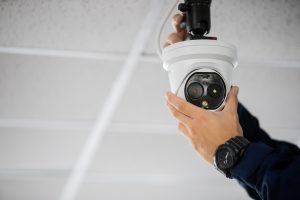CCTVs were once the domain of businesses, but the market for home CCTVs has grown for several reasons. For one, nothing will put a criminal off than knowing you can catch them on camera. Following on, it can also help identify the foolish house-breaker who does consider entering. In addition, using a CCTV camera can reduce your house insurance. They require little maintenance and help monitor the perimeter of your property from the safety of your home. They have also been known to collect footage of animal activity in your garden at night—important if you are growing prize-winning flowers or vegetables.
However, monitoring your perimeter is one of the aspects of using CCTV that can get you in trouble with the law.
The Information’s Commissioners Unit
The ICO is the office that deals with all aspects of data. They regulate, control and enforce the DPA – Data Protection Act 2018 and the GDPR – General Data Protection Regulation. So if CCTV lets you see into your neighbour’s space, any shared spaces or public areas, then the laws of DPA & GDPR apply to you.
The Need To Respect People’s Privacy
While having the right to feel safe in your home, so do your neighbours who might feel a bit unsettled to downright hostile about your CCTV system intruding into their space. You need to consider that they have the right to privacy, including from you and your CCTV.
Your Responsibility Regarding CCTV At Your Home
- Let your neighbours know you are installing a CCTV and listen to their concerns.
- Deciding where to situate your CCTV appropriately is the first thing you need to do. An experienced CCTV installer, like TV Local, can help with this.
- You must correctly install the CCTV, another reason to work with an expert.
- Ensure you are operating the CCTV correctly, and get your installer to teach you.
- You can only use CCTV to protect your property
- You must be aware of other people’s rights under data protection rights.
- If your system stores the recording, you must ensure that the date and time are accurately set. You should also delete recordings promptly.
- Don’t film more footage than you need to. Delete promptly and keep the recordings safe.
Not Breaking The Law
Having a CCTV that views or records the abovementioned areas outside your property is not breaking the law, but you become a data controller. If asked, you have to respond to Subject Access Requests, SARs. People can request access to your recording in writing or verbally. You have one month to respond, giving them a copy of the requested data.
You must also delete any footage of other people if asked to do so unless it is part of a criminal investigation. You can refuse, but they can go to the ICO or challenge you in court. You could be looking at a hefty fine if taken to court or become subject to ICO enforcement.
Consider Your Actions
Using CCTV is not just the simple process of buying a camera system online to put up yourself. There are ramifications to their use, and you should know what those mean to you. Using a professional installer will help guide the positioning and use of the CCTV system, but ignorance of its use is not acceptable if taken to task.





